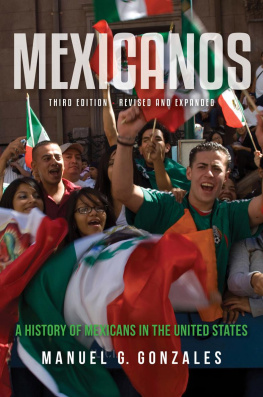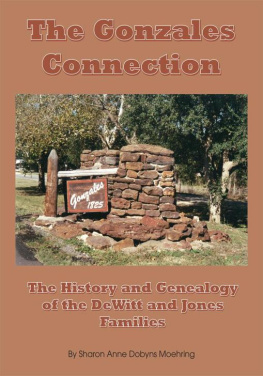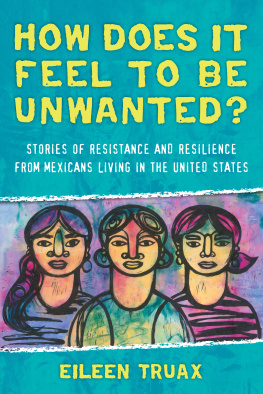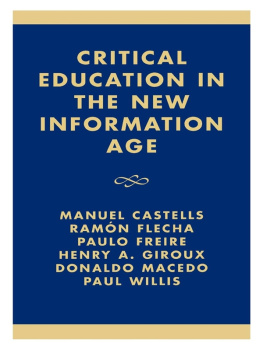This book is a publication of
Indiana University Press
Office of Scholarly Publishing
Herman B Wells Library 350
1320 East 10th Street
Bloomington, Indiana 47405 USA
iupress.indiana.edu
2019 by Manuel G. Gonzales
First Edition 1999
Second Edition 2009
Third Edition 2019
All rights reserved
No part of this book may be reproduced or utilized in any form or by any means, electronic or mechanical, including photocopying and recording, or by any information storage and retrieval system, without permission in writing from the publisher. The paper used in this publication meets the minimum requirements of the American National Standard for Information SciencesPermanence of Paper for Printed Library Materials, ANSI Z39.481992.
Manufactured in the United States of America
Library of Congress Cataloging-in-Publication Data
Names: Gonzales, Manuel G., author.
Title: Mexicanos : a history of Mexicans in the United States / Manuel G. Gonzales.
Other titles: History of Mexicans in the United States
Description: Third edition. | Bloomington, IN : Indiana University Press, [2019] | Includes bibliographical references and index.
Identifiers: LCCN 2019012422 (print) | LCCN 2019012626 (ebook) | ISBN 9780253041753 (ebook) | ISBN 9780253041715 (hardback : alk. paper) | ISBN 9780253041722 (pbk. : alk. paper)
Subjects: LCSH: Mexican AmericansHistory.
Classification: LCC E184.M5 (ebook) | LCC E184.M5 G638 2019 (print) | DDC 973/.046872dc23
LC record available at https://lccn.loc.gov/2019012422
1 2 3 4 5 24 23 22 21 20 19
PREFACE
Today Latinos and Latinas represent 18 percent of the US population. Mexicanos, Mexican-origin inhabitants, continue to constitute the majority of this spiraling demographic, and the account offered here is the story of their history and current status, their accomplishments and failures.
The field of Latina/o studies, of which the history of Mexicanos is an integral part, has been prospering on college campuses across the country since the turn of the century. For the most part, though, aging minority faculty have embraced their younger colleagues. Indeed, many of the up-and-coming luminaries in the field of history were mentored by older distinguished professors. Albert Camarillo, Antonia Castaeda, and Vicki Ruiz are among the most respected of these mentors. However, a few of the veteranos, older faculty members, fear that the current generation of scholars is gradually abandoning the social activism of the foundersin truth, an argument from the beginning that has never gone awaywhich may be true. However, Mexican American scholarship has continued to improve, both quantitatively and qualitatively, which is undoubtedly the most compelling reason for the greater acceptance in academe of ethnic studies today than in the past.
First published in 1999 and revised ten years later, Mexicanos continues to be required reading in a variety of courses at both the high school and college levels, not only in the American Southwest but also throughout the United States. The books widespread popularity in academe mirrors the increasing dispersal of Mexicanos and the interest they have generated throughout the country. This third edition retains the strengths of the previous two editions. Minor revisions have been made throughout to incorporate major new findings in ethnic studies during the past decade and to preserve the narrative flow of earlier editions. Several chapters have been substantially revised, and an entirely new chapter, Mexicanos and the Homeland Security State, has been added. Focusing on the impassioned immigration debate surrounding Mexicanos, this concluding section covers the last ten years of their history, a period of great concern to sociologists and political scientists as well as historians, as my updated bibliography illustrates.
One of the major strengths of Mexicanos is the bibliography. I have tried my best to keep up with the escalating production of doctoral dissertations in recent years and have insisted on incorporating these monographs into the current edition, which may seem pedantic to some casual observers. However, these dissertation titles are important because they provide readers with an idea of the new avenues of historical investigation that young Mexican American scholars are opening up. And, of course, the sheer number of these dissertations is a testament to the growing popularity of Latina/o studies.
Mexicanos is a synthesis based on the works of hundreds of scholars cited in the text. I am indebted to each and every one of them. I also continue to be in the debt of all those friends and colleagues who contributed their time and effort to the book. Several of them should be singled out for special recognition. These include, in no particular order, professors Elizabeth Coonrod Martnez, California State University, Sonoma; Ignacio Garca, Brigham Young University; Juan Mora-Torres, DePaul University; Alexandro Gradilla, California State University, Fullerton; Antonia Castaeda, St. Marys University, San Antonio; Armando Alonzo, Texas A&M University; Deena J. Gonzlez, Loyola Marymount University, Los Angeles; Arnoldo De Len, Angelo State University; Emilio Zamora, University of Texas, Austin; Lorena Oropeza, University of California, Davis; Lisa Jarvinen, LaSalle University; Benny J. Andrs Jr., University of North Carolina, Charlotte; Jos Alamillo, California State University, Channel Islands; and Vanna Gonzales, Contra Costa College. I also wish to thank my colleagues in the Department of History at Diablo Valley College, especially Greg Tilles and Jim Rawls, for insights and encouragement that they provided over the years, and Albert Ponce in the Department of Political Science and David Vela in the Department of English, as well, for kindly sharing their expertise.
Archivist Lillian Castillo-Speed at the Chicano Studies Library, University of California, Berkeley, and two former archivists, Christine Marn at the Chicano Research Collection, Arizona State University, and Walter Brem at the Bancroft Library at Berkeley, have been extraordinarily helpful on this and many other occasions. Kathryn Blackmer-Reyes and Julia Curry Rodrguez, stalwarts at the National Association for Chicana and Chicano Studies, provided valuable counsel.
I want to express my gratitude, too, to Rogelio Agrasnchez Jr., proprietor of the fabulous Agrasnchez Mexican Film Archives at Harlingen, Texas, for his generosity in providing photographs, and to Lauren Shaw, publications manager at the Migration Policy Institute, for her invaluable assistance in finding and procuring maps. Carlos Larralde, formerly of Golden West College, continues to be a loyal collaborator, a constant source of comfort and goodwill. Richard Delgado and Jean Stefancic are other dear friends who have been exceptionally supportive, as was true of the late Edythe M. Cavender.












 MEXICANOS
MEXICANOS


